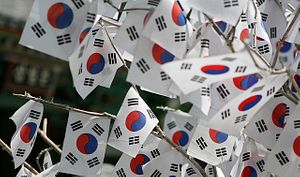For the third time since 2017, South Korea’s embattled conservative opposition has adopted a new party moniker. The short-lived United Future Party is no longer, and subject to confirmation by the National Election Commission, will be known as the People’s Power Party.
The change comes as the party seeks to rebrand after a crushing defeat in the April 2020 legislative elections with the conservatives reduced to an impotent minority and the liberal ruling party claiming a supermajority in the National Assembly.
The name was selected by party committee, drawing from a pool of keywords voted on by party members. Party leadership promised a convention-defying new name, and held up the doubling in the keyword vote total from 2017 as evidence of heightened interest. However, the announcement was largely met with derision online, and drew criticism from party lawmakers themselves who were bypassed in the decision-making process.
Party renaming in the wake of factional realignment, scandal, or electoral defeat is a common practice in South Korean politics. While liberals cycled through a procession of names until settling on the current iteration in 2014, the conservatives represented stability. After the conservatives’ 15-year stretch as Hannara (literally “one country”), gearing up for a presidential run, Park Geun-hye stamped her mark in 2012 with the name change to Saenuri (literally “new world”).
The 2017 impeachment of President Park saw the breakdown of that relative stability, and the main conservative party has now used four different titles in as many years. In an attempt to distance itself from Park’s tainted legacy, the party adopted a more traditional conservative name in 2017, Liberty Korea Party. The switch in February this year to the United Future Party was triggered by the reabsorption of a splinter party in the run-up to the April legislative elections.
The disastrous results of that election brought an end to Hwang Kyo-ahn’s reign as party chief, as he and a host of other party heavyweights lost their races. Into the power vacuum stepped Kim Chong-in. A veteran economist-turned-politician, Kim has had stints in both the liberal and conservative parties. Although Kim’s position is that of interim leader, he secured guarantees to avoid merely being a powerless figurehead. With the scope to try to enact his agenda, Kim has repeatedly spoken of his intent to radically reform the party.
The renaming is part of a broader rebranding effort. New party colors and a new party logo are also set to be unveiled before the Chuseok holidays in late September. The announcement of the name People’s Power Party raised eyebrows due to its similarity to the People’s Party, a center-right party led by Ahn Cheol-soo.
While Ahn declined to go on the attack about a naming conflict, he has repeatedly rejected the idea of a merger with a party that has not yet cleaned up its image. Ahn’s pre-conditions to such a merger are that the party move away from its throwback anti-communist era rhetoric, its ties to controversial evangelical groups, and its integration into the far right YouTube ecosystem.
This points to the challenge facing Kim: convincing less ideological voters displeased with the current government that the conservatives have truly changed without alienating the vocal, activist hard right. To revive a party that has arguably slipped into existential crisis would require a public severing of ties with outspoken reactionary elements, which the party embraced under Hwang’s leadership.
While Kim’s decision to go back to the tired playbook of party renaming is unlikely to convince anyone that the party is undergoing a revolution, the announcement of a new policy platform has the potential to provide substance to what so far has been a superficial reform drive.
The centerpiece of the new policy platform is a “Korean-style basic income” along with other progressive policies such as increasing the supply of public housing and education equality. The party is also trying to address its age-demographic weakness through a youth-specific policy program and a commitment to lower the age of eligibility to run for office.
Although a policy agenda that breaks with conservative tradition would risk open rebellion from certain quarters of the party, Kim has tried to create space for such a shift by hammering the message that the party is in a crisis and risks terminal decline if drastic action is not taken.
Kim’s own history with the conservative party is indicative of his commitment to some economic redistribution, and the hollowness of conservative promises along those lines. The last time Kim was in the conservative camp he was the main advocate for “economic democratization,” and Park Geun-hye surprisingly integrated the idea into her platform only to quietly drop the agenda early in her term.
While much can happen before the next party leader is chosen at the April 2021 party conference, Kim has his sights set on by-elections scheduled for the same month. The 2021 by-election carries unusual import with the mayor posts in the largest cities of Seoul and Busan up for grabs. With Kim’s power base within the party decidedly shallow, and the party’s repeated rejection by voters at the polls, liberal collapse rather than conservative rebirth remains the party’s most likely route back to relevance.
Kyle Pope is a former Korea Policy Analyst currently focusing on South Korean domestic politics at the Academy of Korean Studies.
Simon Voget is an editor and translator based in Seoul. He holds an MA in linguistics from SOAS, University of London
































